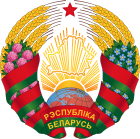
Back سياسات بيلاروسيا Arabic Belarusun dövlət quruluşu Azerbaijani Белоруссияның дәүләт ҡоролошо Bashkir Палітыка Беларусі Byelorussian Дзяржаўны лад Рэспублікі Беларусь BE-X-OLD Държавно устройство на Беларус Bulgarian বেলারুশ#রাজনীতি Bengali/Bangla Politisches System von Belarus German Πολιτική της Λευκορωσίας Greek Política de Bielorrusia Spanish
This article needs additional citations for verification. (August 2008) |
 |
|---|
|
|
|
|
The politics of Belarus takes place in a framework of a presidential republic with a bicameral parliament. The President of Belarus is the head of state. Executive power is nominally exercised by the government, at its top sits a ceremonial prime minister, appointed directly by the President. Legislative power is de jure vested in the bicameral parliament, the National Assembly, however the president may enact decrees that are executed the same way as laws, for undisputed time.
During Soviet times, present day Belarus had a communist political system that was constitutionally defined as a Marxist–Leninist single party socialist republic guided in part by the political ideas of Karl Marx, one of the fathers of historical materialism, as well as by Friedrich Engels and Vladimir Lenin. The sole legal governing party was the Communist Party of Byelorussia (CPB), which was permitted according to the constitution.
Belarus' declaration of sovereignty on 27 July 1990 did not stem from long-held political aspirations, but from reactions to domestic and foreign events. In particular, Ukraine's declaration of independence led the leaders of then Belarusian SSR to realize that the Soviet Union was on the brink of dissolving.
After the establishment of a Republic on August 25, 1991, Stanislav Shushkevich was selected to be the first Belarusian leader and held this position until 1994. Shushkevich hoped to guide the country away from its Soviet past and supported social democratic reforms. His successor, Alexander Lukashenko, upon assuming office in 1994, began to re-instate Soviet-era functions and reintroduced the symbols from Soviet Belarus.
Lukashenko heads an authoritarian government and has often been referred to as "Europe's last dictator".[1] Elections are not considered to be free and fair by international monitors, opponents of the regime are repressed, and the media is not free.[2][3]
- ^ Tharoor, Ishaan. "Analysis | Can people power topple Europe's 'last dictator'?". Washington Post. Retrieved 24 August 2020."Profile: Alexander Lukashenko". BBC News. BBC. 9 January 2007. Retrieved 7 August 2014.
'..an authoritarian ruling style is characteristic of me [Lukashenko]'
Levitsky, Steven; Way, Lucan A. (2010). "The Evolution of Post-SovietCompetitive Authoritarianism". Competitive Authoritarianism: Hybrid Regimes after the Cold War. Problems of International Politics. Cambridge: Cambridge University Press. p. 203. ISBN 9781139491488. Retrieved 12 June 2020.Unlike his predecessor, Lukashenka consolidated authoritarian rule. He censored state media, closed Belarus's only independent radio station [...].
Treisman, Rachel (16 August 2020). "One Week After Election, Belarus Sees Giant Protests Against 'Europe's Last Dictator'". NPR. Retrieved 24 August 2020. - ^ Jones, Mark P. (2018). Herron, Erik S; Pekkanen, Robert J; Shugart, Matthew S (eds.). "Presidential and Legislative Elections". The Oxford Handbook of Electoral Systems. doi:10.1093/oxfordhb/9780190258658.001.0001. ISBN 9780190258658. Retrieved 21 May 2020.
unanimous agreement among serious scholars that... Lukashenko's 2015 election occurred within an authoritarian context.
Levitsky, Steven (2013). Competitive authoritarianism: hybrid regimes after the Cold War. Cambridge University Press. pp. 4, 9–10, 21, 70. ISBN 978-0-521-88252-1. OCLC 968631692.Crabtree, Charles; Fariss, Christopher J.; Schuler, Paul (2016). "The presidential election in Belarus, October 2015". Electoral Studies. 42: 304–307. doi:10.1016/j.electstud.2016.02.006. ISSN 0261-3794. S2CID 155377250."Belarus strongman Lukashenko marks 25 years in power | DW | 10 July 2019". Deutsche Welle. Retrieved 21 May 2020. - ^ "Belarus leader dismisses democracy even as vote takes place". AP NEWS. 17 November 2019. Retrieved 21 May 2020.Rausing, Sigrid (7 October 2012). "Belarus: inside Europe's last dictatorship". The Guardian. London. Retrieved 7 August 2014.World Report 2020: Rights Trends in Belarus. 10 December 2019. Retrieved 21 May 2020.
{{cite book}}:|website=ignored (help)"Human rights by country – Belarus". Amnesty International Report 2007. Amnesty International. 2007. Archived from the original on 12 December 2007. Retrieved 22 December 2007.
© MMXXIII Rich X Search. We shall prevail. All rights reserved. Rich X Search